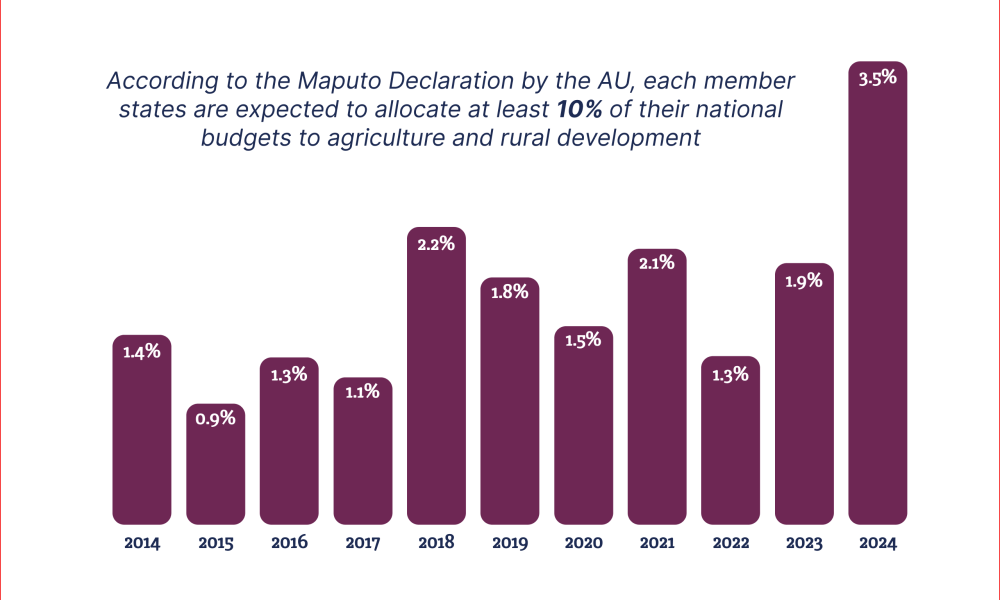🌿 Ruzu Non-Alcoholic Herbal Bitters
Ruzu Non-Alcoholic Herbal Bitters is a natural health supplement specially formulated to:
- ✅ Promote general wellness
- ✅ Detoxify the body
- ✅ Support the treatment of various ailments
Made from a powerful blend of 100% organic and medicinal herbs, Ruzu is completely alcohol-free, making it ideal for:
- 👪 All age groups
- 🌱 Health-conscious individuals
- 🌿 Anyone seeking non-alcoholic herbal remedies
Whether you're looking to boost your vitality, cleanse your system, or support healing the natural way, Ruzu Bitters offers a trusted herbal solution.
In July 2003, the African Union’s Second Ordinary Assembly in Maputo saw African Heads of State and Government endorse the Maputo Declaration on Agriculture and Food Security in Africa.
This declaration outlined several key decisions aimed at improving agriculture on the continent, including a commitment by member states to allocate at least 10 per cent of their national budgets to agriculture and rural development.
Despite this commitment, findings by RipplesMetrics showed that Nigeria has failed to meet this benchmark consistently over the years.
In the last one year, Nigeria’s inflation rate has consecutively increased to an all-time high, surpassing the highest record in 1996. Recent data from the National Bureau of Statistics showed that the inflation rate stood at 33.69 per cent. This is the 11th consecutive time under President Boal Tinubu since he assumed power in May 2023.
Also, the food inflation rate for the month under review in March 2024 was 40.53 per cent.
When the president assumed office, he said, “Agricultural hubs will be created throughout the nation to increase production and engage in value-added processing. The livestock sector will be introduced to the best modern practices and steps taken to minimize the perennial conflict over land and water resources in this sector.
READ ALSO:RipplesMetrics: Assessing Nigeria’s economy, one year after Tinubu’s assumption
“Through these actions, food shall be made more abundant yet less costly. Farmers shall earn more while the average Nigerian pays less.”
However, findings from the 2024 budget as well as the rising cost of food production and sales do not agree with the president’s speech.
In January, Tinubu signed the 2024 budget of N28.78 trillion into law. However, only 3.5 per cent of the budget was allocated to the Federal Ministry of Agriculture and Food Security.
This allocation is far lower than the Maputo Declaration target signed over two decades ago. Meanwhile, just like Tinubu, other previous presidents have not also met the Maputo target.
The trend
Ripples Metrics findings showed that in 2015, Nigeria’s total national budget was N4.49 trillion, with only N40.66 billion allocated to the agriculture sector, representing a mere 0.9 per cent. This allocation increased slightly between 2016 and 2019 but still failed to reach the 10 per cent target.
In 2020, the percentage of agriculture was 1.4 per cent of the total N10.81 trillion. Also from 2021 to 2023, the agricultural sector got 2.06 per cent, 1.26 per cent and 1.96 per cent respectively across the years.
This lack of investment in agriculture has likely hindered the sector’s growth and development, with potential consequences for food security and rural development in the country. By allocating a greater proportion of its national budget to agriculture, Nigeria can take a crucial step towards achieving these important objectives.
By: James Odunayo
If you like what we do, and are ready to uphold solutions journalism, kindly donate to the Ripples Nigeria cause.
















